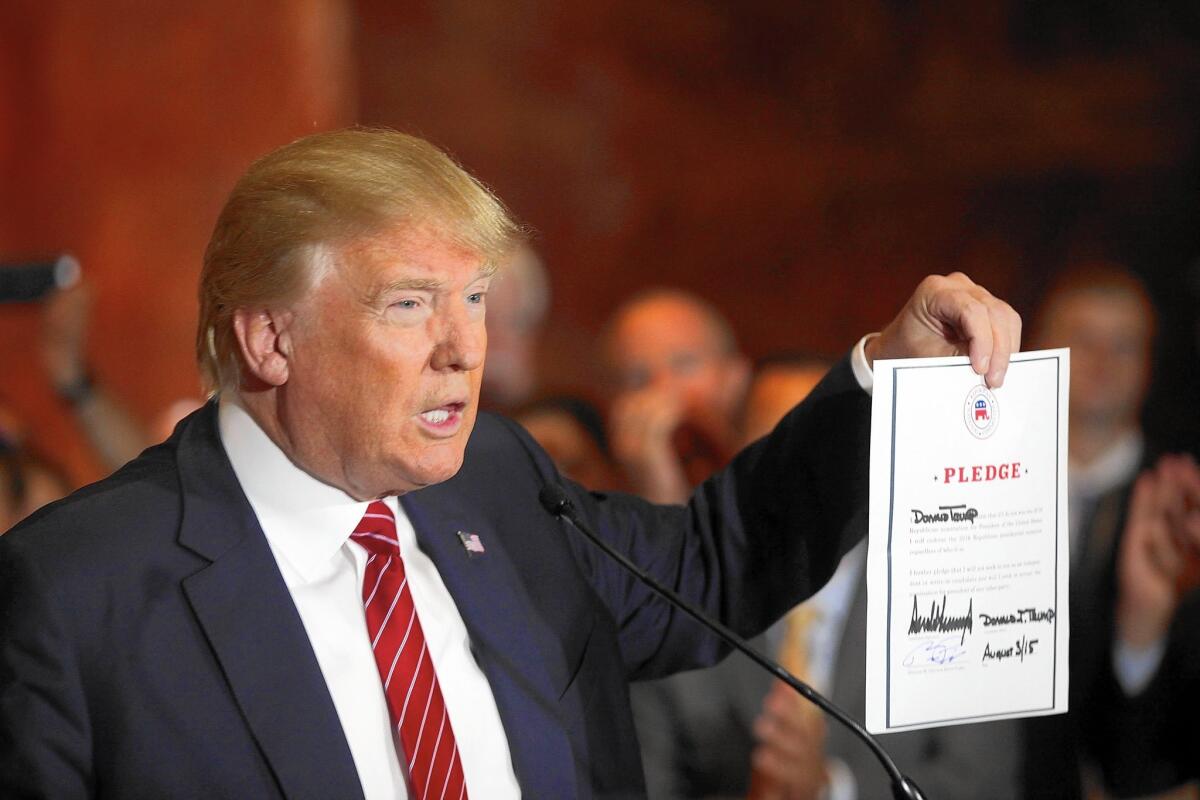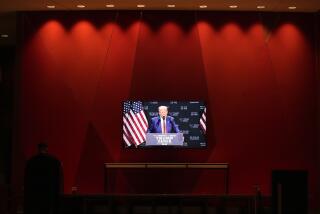With flourish, Trump rejects independent bid if he loses GOP nomination

Donald Trump holds up a pledge -- dated Aug. 3. He later tweeted a document with the correct date.
Reporting from Washington — With his typical showmanship and a hint of the absurd, Donald Trump promised Thursday to forgo an independent bid for the White House if he loses his quest for the Republican nomination, a move that was aimed at easing worries of the party establishment but may only serve to boost his unpredictable, rogue campaign.
Standing in the opulent and packed lobby of his Trump Tower in midtown Manhattan, Trump held up the document — which was mistakenly dated Aug. 3 instead of Sept. 3. — at a midday news conference and declared he was “pledging allegiance to the Republican Party and the conservative principles for which it stands.”
He signed the document, he said, because he believes the best way for a Republican to win the White House is for Trump to secure the party’s nomination and face off directly against a Democrat.
“For that reason, I have signed the pledge,” he said, lifting and posing with the backdated paper in front of a throng of flashing cameras. He later tweeted another, correctly dated copy, without acknowledging the mistake.
Republican Party officials circulated the 70-word pledge to all 17 GOP candidates this week, but the effort was aimed squarely at the one leading the pack in most polls. The billionaire celebrity was the only top-tier candidate who would not publicly promise to rule out an independent bid in the general election when he was asked to do so at the first primary debate last month.
The prospect of Trump paying for his own third-party campaign sends shivers down the spines of the GOP officials, who believe such an endeavor, however unlikely, would pull conservative voters away from the nominee and hand victory to the Democrats.
Republican National Committee Chairman Reince Priebus met with Trump on Thursday at the tower to collect the document. Priebus left the building without commenting at the news conference.
For all its theatrics, the Republican National Committee’s scheme has little practical or legal impact. And Trump’s adherence to it may be as enduring as the first version he waved at the lectern.
Election lawyers say the pledge is not legally binding because it does not promise the parties anything in return for their loyalty.
“As a matter of contract law, it doesn’t look like an enforceable contract,” said UC Irvine law professor Richard Hasen, who specializes in election law.
“To be a binding contract, they have to be giving something, and what could they give?” Hasen asked.
Trump told reporters he received “absolutely nothing, other than the assurance that I would be treated fairly” in return for his signature, a statement that might leave some room for later interpretation. Asked whether he would change his mind, he said, “No, I have no intention of changing my mind.”
The party appears to be simply banking on candidates’ unwillingness to break a promise, Hasen noted.
“If [Trump] later changed his mind, he would be painted as a hypocrite for promising one thing and doing something else,” Hasen said.
Michael Kang, a professor at Emory University in Atlanta who has written about election laws, called the pledge “an attempt to replicate the effect” of so-called sore-loser laws. Such laws stipulate that a registered primary candidate cannot switch parties or become an independent to run in a general election, though states rarely apply them to presidential candidates, Kang and Hasen said.
Kang called the enforcement of such a pledge an “open question.”
“It’s safe to say that there would be constitutional questions about their enforceability,” Kang said.
Although the pledge might offer some comfort to party stalwarts, it could also boost Trump’s standing among the Republican faithful who have bristled at his reluctance to commit to the party. The pledge also ensures that if Trump wins the nomination, his former rivals will endorse him — or break their word.
Trump’s news conference went on to demonstrate why his candidacy is such a quandary for the Republican Party. In rapid fire, he fielded a range of questions — offering his thoughts on Kanye West (“I love him”), New England Patriots quarterback Tom Brady (“a great guy”), Latino voters (“I love the Hispanics”) and his top target this week, Jeb Bush.
Bush is “a very low-energy person, and I don’t think that’s what the country needs,” Trump said, repeating his favorite slam against the former Florida governor, rival and a candidate he had moments ago promised to endorse if Bush wins.
“Every negative ad you see against me is paid for by lobbyists and special interests,” he said.
Bush answered the hubbub over the pledge by tweeting a version of his own: a handwritten note reading “voted Republican since 1972 — Jeb Bush.”
Twitter: @khennessey
Twitter: @tomanmiller
More to Read
Sign up for Essential California
The most important California stories and recommendations in your inbox every morning.
You may occasionally receive promotional content from the Los Angeles Times.











